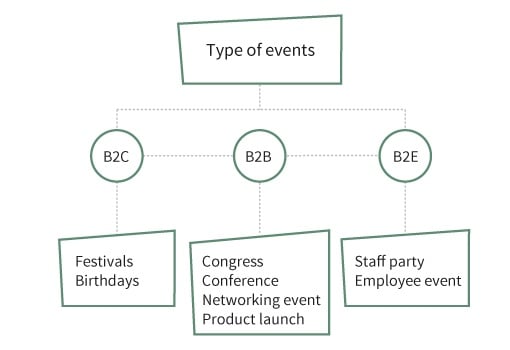This blog gives a concise overview of the most common types of Business to Business events (B2B). Per type, we list the most important characteristics and how to respond to them.

Conference
A conference features one substantial theme or topic, mostly from one specific angle or industry (eg. medical or sports). Conferences can be organised by one initiator, but in most cases there is a collective of organisations behind it. Tickets are usually paid for by the employer. In corporate organisations, conferences are often called symposia.
Characteristics:
- Paid event: participation is only possible after purchasing a ticket.
- Big audiences: hundreds or even thousands of participants.
- Checking in and checking out attendees is customary.
- Complex program with multiple speakers and (registered) sub-sessions.
- One-day or multiple day events - attendees may need to book a hotel in the area.
Networking event or network meeting
Networking is important to many organisations. All attendees to the event have knowledge or a story to share. These events are opportunities for meeting new people and strengthening existing relations. By publishing a guest list on the event website, you can stimulate networking before and after the event. Inviting extra guests is often desirable, in order to expand the network.
Characteristics:
- Free events, invitation-only. Sometimes a small contribution is requested, to cover catering and/or location costs.
- Specific target audience: peers, industry partners, people with similar backgrounds.
- Extra guests are welcome: invitees are often stimulated to bring a peer or colleague.
Product launch
For the launch of a new product, you invite (potential) clients or customers, influencers and press. To create the necessary level of buzz, nurturing emails - personalised emails, each with a specific message - are essential for this type of event. The account managers or stakeholders within your company know who is interested in your brand new product, so give them the chance to invite their own relations to the event.
Characteristics:
- Free events on invitation: you want to invite the right people to the presentation.
- Different messages for various target groups: partners, press, influencers etc.
- Multiple entry tickets for different audiences or program elements.
- Stakeholders or account managers invite their own contacts.
Internal (employee) meetings
Almost every company organises employee (Business to Employee) meetings or staff parties on a weekly basis - including board meetings, department meetings, Friday drinks or a yearly Christmas party. Invitees should know when and where they are expected, what the program looks like, what to prepare etc. The possibility to exchange documents is appreciated - as is a calendar link for the event.
Characteristics:
- B2E events are free of charge and on invitation.
- Small to medium sized groups.
- Homogeneous audience: employees of the same organisation, team or department.
- No need to create multiple entry tickets.
Conclusion
Most organisations host more events than you might expect. Each event type has specific characteristics and requires a different approach. It is important to keep these requirements in mind when selecting your event software.

